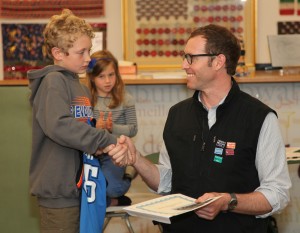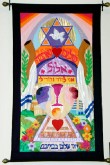The Mensch Series: #1 What is a Mitzvah?
Lesson: What is a Mitzvah?
 Being a Mensch (good person) is one of the most important aspects of being Jewish. In this session, you will learn about the notion of Mitzvah (commandment) and how it relates to being a mensch. you will learn:
Being a Mensch (good person) is one of the most important aspects of being Jewish. In this session, you will learn about the notion of Mitzvah (commandment) and how it relates to being a mensch. you will learn:
- History: Where the idea of Mitzvah started in Judaism
- The Mitzvah of welcoming guests: Hachnasat Orchim
- The Mitzvah of visiting the sick: Bikkur Cholim
- The Mitzvah of using good language: L’shon Hara
#1 Let’s DEFINE the word, Mitzvah
 A mitzvah is more than just a good deed, it is a commandment from God, and Judaism is the only religion that has mitzvot. There are LOTS of mitzvot and different types of mitzvot. For example, It’s a mitzvah to help an elderly person across the street. It’s a mitzvah to visit Israel. It’s a mitzvah to say the blessing for candles on Shabbat.
A mitzvah is more than just a good deed, it is a commandment from God, and Judaism is the only religion that has mitzvot. There are LOTS of mitzvot and different types of mitzvot. For example, It’s a mitzvah to help an elderly person across the street. It’s a mitzvah to visit Israel. It’s a mitzvah to say the blessing for candles on Shabbat.
#2 READ this short word about three different types of Mitzvot
 Once upon a time, about 1000 years ago, a man named The Rambam wrote a book about Mitzvot in Judaism. He determined there were 613 Mitzvot that were of divine origin. Practicing these mitzvot, or commandments, helped a person live a good and ethical life. We will explore several of these mitzvot and values in future lessons and we are starting with three. These three are at the top of our list because they are focused on how a person lives in community.
Once upon a time, about 1000 years ago, a man named The Rambam wrote a book about Mitzvot in Judaism. He determined there were 613 Mitzvot that were of divine origin. Practicing these mitzvot, or commandments, helped a person live a good and ethical life. We will explore several of these mitzvot and values in future lessons and we are starting with three. These three are at the top of our list because they are focused on how a person lives in community.
- The Mitzvah of welcoming guests: Hachnasat Orchim
- The Mitzvah of visiting the sick: Bikkur Cholim
- The Mitzvah of not gossiping: L’shon Hara
Can you imagine a world, or a community, even in your own family or with your friends, where these four mitzvot were observed? No matter where you went, you would be welcomed in a kind and peaceful way by others – even strangers. If you got sick and were housebound or in the hospital, people would come and visit you regularly and keep you company. Finally, and perhaps most important, people would always speak kind of others and never gossip or say mean things behind your back.
#3 STUDY these Jewish teachings about L’shon Hara (not gossiping)
 King Solomon says, “Life and death are in the power of the tongue, and those who love it (lashon hara) will eat it’s fruit.” (Proverbs 18:21).
King Solomon says, “Life and death are in the power of the tongue, and those who love it (lashon hara) will eat it’s fruit.” (Proverbs 18:21).
The Talmud (Arachin 15b) explains that negative speech is even worse than a sword – since it kills many people, even at great distance.
Guard your tongue from evil and your lips from speaking deceit. Depart from evil, and do good; seek peace and pursue it.” Psalm 34:12-14
#4 Watch this short video on Lashon Hara (Not gossiping)?
#5 WATCH this video on another Mitzvah, Visiting the Sick
Bikkur Cholim, visiting the sick, is an important mitzvah in Judaism that started when God visited Abraham following his circumcision in the story of the Torah. Today, you can visit a sick person as a caring visitor and there are also members of special organizations called “Bikkur Cholim Societies,” that also visit the sick.
#6 WATCH The Fountainheads celebrate Sukkot by Welcoming Guests – Hachnasat Orachim
Hachnasat Orchim (welcoming guests) is a core Jewish value, biblically modeled by Abraham and Sarah in the Book of Genesis. When guests unexpectedly arrived at the tent of Abraham and Sarah, the couple warmly welcomed the visitors, made them comfortable, and fed them generously. On important theme of the holiday of Sukkot is “welcoming strangers” into the booths – or sukkahs.
#7 Respond and React
Now that you have watched the videos, read the story, and learned about Mitzvot, please respond to these questions in your Tamid Workbook.
1. What is the english translation of Mitzvah?
2. What are the three Mitzvot you learned today and give a one sentence definition for each mitzvah.
3. Why is L’shon Harah (avoiding gossip) an important mitzvah?
4. What should you do when people around you are gossiping?
5. Of the three mitzvot you studied today, what is the most important one in your opinion?
6. If you had to create a mitzvah, what would you choose?
Need some help?
We’re here for you. At any time, if you have any questions, please contact one of our teachers so we can help you.
Also, at the end of the session, remember to review your responses in your Tamid Workbook so you can get credit for this lesson. Behatzlacha (Hebrew for good luck)!
You can reach us at (646)360-0689 or connect@tamidnyc.org
